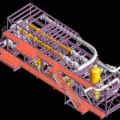
For an engineering project, the typical life cycle looks something like this:
- Conceptualization.
At the point which a need or opportunity is identified, an agency begins to develop a conceptual plan for a new product or service.
- Feasibility.
Budget level estimates are prepared for the necessary phases and the financial implications (revenue vs. costs) are estimated. Estimates are prepared to a level of detail (usually 25 – 30%) to give management enough confidence for a go/no-go decision. Metrics such as Net Present Value, Internal Rate of Return, and Payback Period are used to give management a picture of what the cost-benefit equation looks like. Often, but not always, outside consultants are hired for feasibility studies.
- Preliminary Engineering / Planning.
At this stage the project has usually been funded. Preliminary Engineering involves itemizing the different options for the project and carrying out enough engineering to choose between the different alternatives. It’s no longer a question of whether the project will be done, but what will be built. This step usually concludes with a final preliminary engineering report (a.k.a final planning report).
- Detailed Design.
Once it is clear what will be designed, all of the engineering analyses are performed to their required completion. The end result is usually a set of drawings and technical specifications.
- Execution.
At this stage the construction/implementation of the work takes place. Because of the engineer’s responsibility to ensure adequate construction/implementation of the work as designed, there is usually some sort of engineering oversight. Engineers also tend to be focused on the final product configuration, not necessarily constructability, so the engineer is often involved to answer questions and ensure a smooth process.
- Testing and commissioning.
Once all of the execution phase is complete, the final product is tested and commissioned. All of the outstanding funding and administration issues are completed, and final project documentation is archived.

